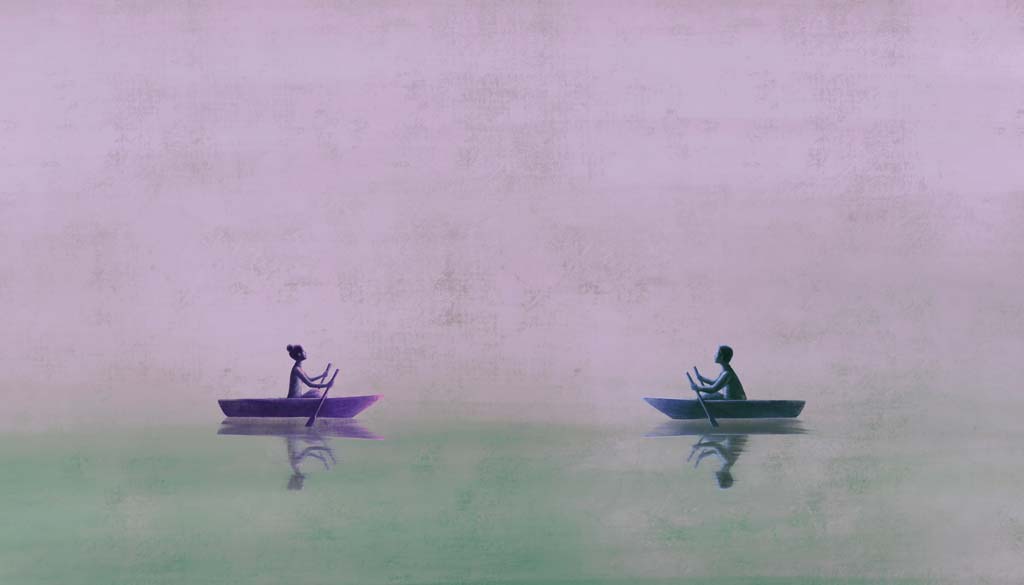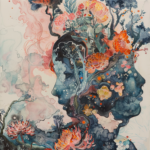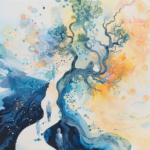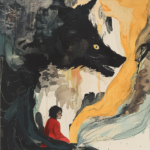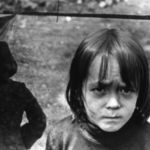CIPS NewsBriefs - Spring 2022
A Drop in the Ocean: some thoughts about climate change
Submitted by Jennifer Davids, BPAS, FIPA
During the first lockdown in March 2020, I noticed how the outlines of leaves were sharper and the air I breathed, felt cleaner. The skies were often a beautiful shade of blue marked by the occasional white aeroplane trail, and there was a calming silence sometimes pierced by the sound of ambulance sirens. The world felt simpler: it had contracted. When a warm London spring followed, I could imagine that the paradise would last forever. Had we put pollution and climate change on hold? Guiltily I recalled the ridiculously cheap, often single figure, air fares to Europe offered by budget airlines some years ago.
But then a summer heatwave arrived. A nine year old girl asked, “Mum, is the heating on?” Her mother laughed, remarking, “If only it were that simple”. The uncomfortable reality had hit home. Inspired by Greta Thunberg, the troubled teenage climate activist, I decided to attend an online conference on climate change offered by the Freud Museum. There I rediscovered Searles’s 1972 ground-breaking paper Unconscious Processes In Relation to the Environmental Crisis. Masterfully he addressed the profound anxieties that underpin our apathy in relation to the ecological crisis as well as our destructiveness to Mother Earth. Similar to Vanessa Nakate (2021), a young female Ugandan eco-activist, Searles posited that we can face such painful issues and that we are not powerless. He wrote:
“To react with apathy to our present pollution-ridden “real, outer” world is, I think, equivalent to defending oneself unconsciously against the experience of becoming an individual human self, a self which, in the very nature of human living, must contain a whirlpool of emotional conflicts, at times so chaotic, as to threaten the dismemberment of one’s very self” (p. 372).
Searles argued that we have idealised technology and certain consumer goods e.g., the car. During the past 18 months, on my daily walks in my neighbourhood, I notice increasing numbers of Teslas. I admire their lines and am aware of my envy of such cars, which are way beyond my budget. Are they the new ecologically correct status symbol? Sales of bicycles and motorised scooters have soared during the pandemic, with long waiting times due to problems in the supply chains. I feel relieved to hear that several of my patients have managed to buy these eco-friendly forms of transportation, helping me manage some of my eco-anxiety and eco-guilt. I feel comforted when my recycle bin is brimming. A sceptical male colleague says, “Why bother? Surely you know it goes to landfill anyway.” I feel deflated. Am I being naïve? Further reflection leads me to hold on to my belief that I am making a small but necessary gesture. Interestingly Dodds (2011) described this defensive attitude of “All the king’s horses and all the king’s men can’t put the climate back together again, so why should we bother?” (p. 44) as closest to recognising and engaging with the problem. He pointed out how despair can override unrealistic hope. This is often the fate of short term flash -in- the pan activism which privileges manic repair.
In Autumn 2021, a child patient sends me in the post her most recent drawing of her favourite animal, a panda bear. The panda is chomping on some bamboo. She has written a comment: “Pandas don’t get Corona.” A wish for immunity perhaps. I recall one of our first encounters, pre-pandemic, when she conveyed her own sense of existential threat and her anxieties about being valued by her new foster family, through talking about panda bears being in danger of extinction. She had drawn a similar picture of a hungry big panda munching bamboo. At that time I was sitting on a sofa, with a bamboo frame. I had hypothesized that she feared her wishes to eat precious me up; I thought she was communicating her own projected need to be special, alongside her urgent wish to be protected and saved like the panda. Drawings of hungry sharks followed. The sharks were lost, had become vegetarians, as so many other sea creatures had disappeared, and people did not swim at that polluted beach anymore. This rich material conveyed many of my 10 year old patient’s anxieties as well as her defences against them. Recently she asked in a remote session (we have not resumed work in the consulting room), “Is there still bamboo in your garden?” Again, the wish for continuity, growth and the fear of lack of supply. The darkest cloud seems to be the terror of my and the panda bear’s dying and dying out, the ultimate annihilation and the leaving of little or no legacy. There is significant interplay between my patient’s inner and outer worlds, and our shared reality.
Born in and identified with Africa, I end with the link between climate change, economic hardship and dislocation. Nakate writes of the lopsided and unjust situation:
“Although the African continent has just 15% of the world’s population, it is responsible for only between two and three percent of global energy related carbon dioxide emissions. The average African’s greenhouse gas emissions are a fraction of those of people living in the US, Europe, China, the United Arab Emirates, Australia or many other countries” (p.2).
She argues that the African countries with the fewest resources and who have contributed the least to climate crisis are contending with the gravest consequences: more frequent and more serious flooding, longer drought periods, extreme heat, and rising sea levels. “Increased food scarcity, forced migration, economic losses, and higher rates of death are also just proportionately affecting people of colour not only across Africa and the rest of the global south but in the global north too” (p. 3).
Stripped of their livelihood families are forced to be on the move. I agree that we can face our apathy and then unfrozen, act with hope at this crisis time when the stakes are so very high. The pandemic reminds us that “climate change is not in lockdown” (Nakate, p 6.). And that “while we may all be in the same storm, we are not in the same boat” (Thunberg, 2021). I believe, we have enough Ubuntu, an African concept of deep connectedness and interrelatedness, to turn to, in our efforts to keep our beloved planet, our Earth-breast alive.
References
Dodds, J. 2011. Psychoanalysis and Ecology at the Edge of Chaos. Routledge:Sussex/New York.
Nakate, V. 2021. A Bigger Picture. My Fight to Bring a New African Voice to the Climate Crisis. One Boat: London.
Searles, H. 1972. Unconscious processes in relation to the environmental crisis. Psychoanalytic Review, 59(3),361-374.
Thunberg, G. 2021. Endorsement of A Bigger Picture.
